Team Israel’s Jewish Bambinos Own Brooklyn Baseball for a Weekend
Kids, adults, and lots of blue and white were ubiquitous during a sunny ballgame in Coney Island
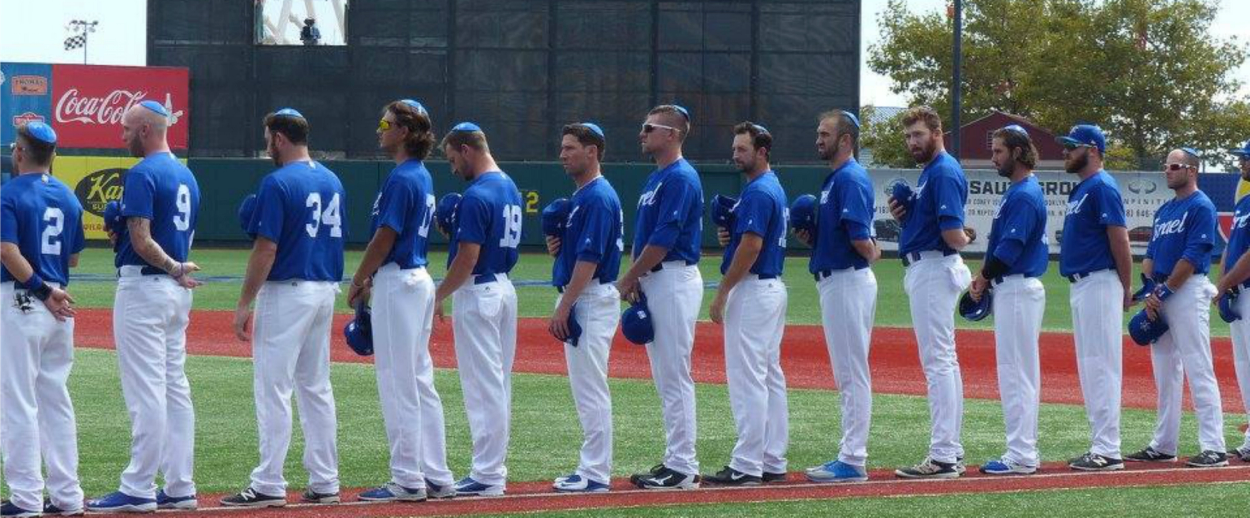
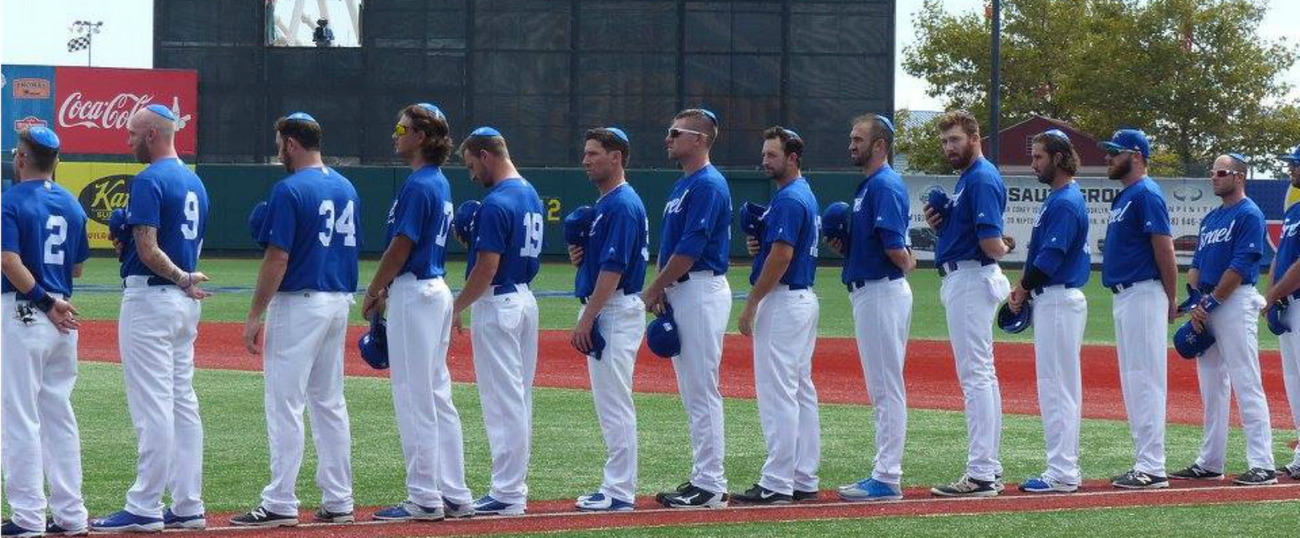


I arrived at MCU Park in Coney Island excited to do some small-town baseball reporting. Brooklyn isn’t small by any means, nor is it a town, but that was the definitive vibe last Friday afternoon when I showed up during an ardent top-half of a middle inning—a few hours before Shabbat—of Israel’s game against Brazil in the qualifying tournament of the World Baseball Classic. On the train ride in I wondered: Does Israel have baseball fans, or are they simply supporters of Israel? Who attends a ballgame with a noon start time, and on a Friday no less? How much blue and white would I see? How many edible kosher things can I fit into my belly so as to extend my paunch the way God intended?
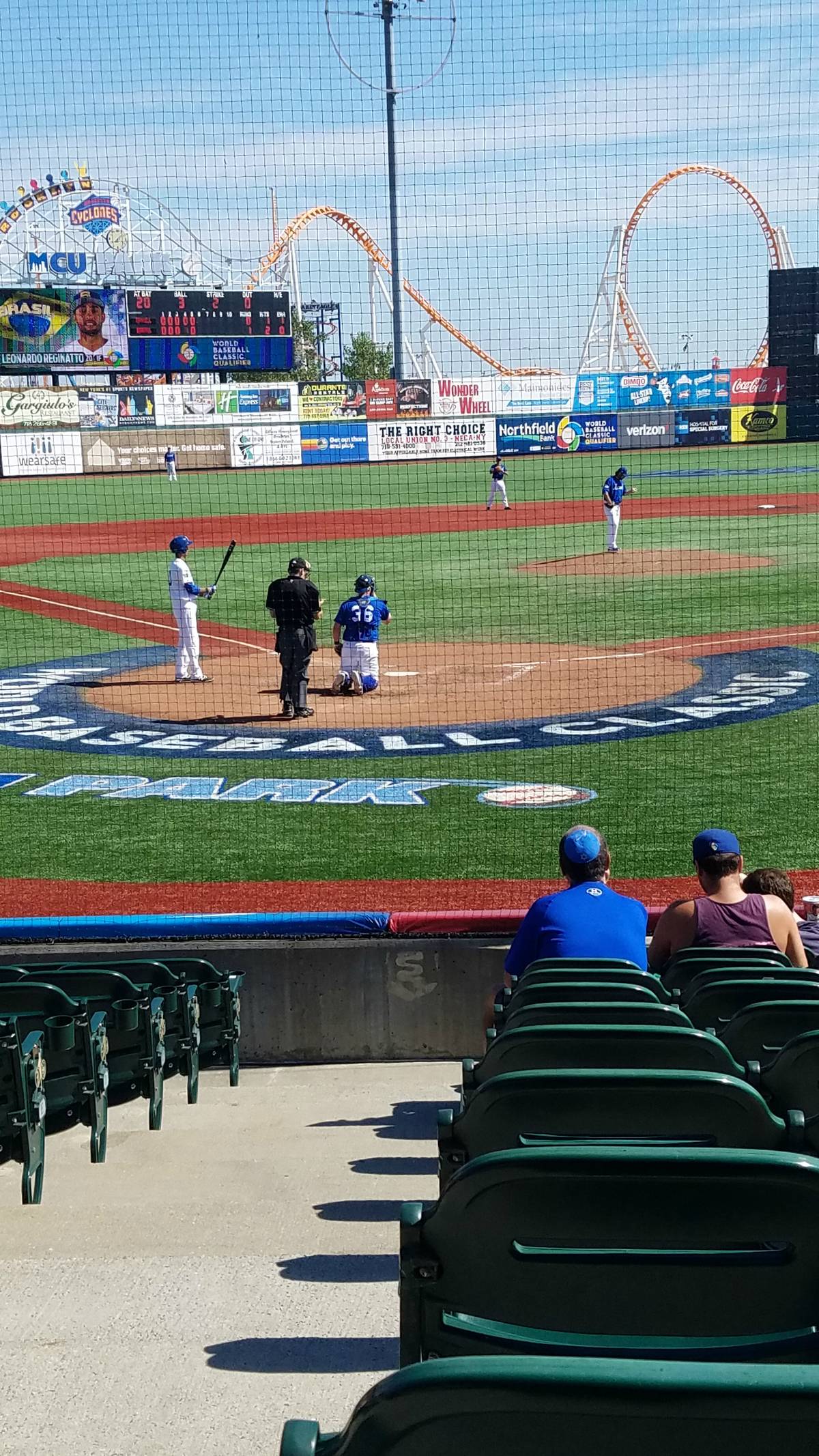
MCU Park, where the Cyclones play every summer, feels like a typical minor league stadium, which is to say that it’s spacious yet quaint while offering good views of advertisement-thick outfield fences and cheap, family-friendly seats. The stadium was fairly empty and bifurcated: fans of Israel lined the first base line; fans of Brazil (or “Brasil,” as was written on the players’ unis), lined the third base line. There were maybe 1,000 people at the game—1,500 max—and I’d say majority of them were rooting for team Israel. This was, of course, Brooklyn. Both teams for blue and white.
“… the population is 8 million and the capital iiiiiiiiiiiiiiiiiiiiiiiiissssss Jerusalem,” the stadium announcer blared, quelling any doubt.
Baseball, in case you’ve forgotten, is for the kids, and there were plenty of them there. I spotted a gaggle of kippah-clad boys tucked into the right field corner, waiting, waiting, waiting for a ball to come their way whichever way it could: a foul ball, a gift from a reliever or outfielder, heaven. Soon enough, a rocket came down the first base line, past the Israeli dugout, and screamed foul. It bounced up and over the wall and into this group of baseball hungry boys. They climbed over each other at once, up through plastic seats and narrow aisles, in order to snag a round, leather trophy that they could brag to their friends about, and maybe put under their pillows, or on a shelf.
The boys scrambled and formed a pig pile, stacked maybe four-high. In the middle of it was a young girl whom I’d not spotted at first glance. And it was she who emerged from this pile with a smile—and with a baseball. She whipped her strawberry blonde ponytail around, smiled again, and looked around before running back to where her Magen David Yeshivah classmates were sitting. I went over to her.
“How’d it feel to snag that baseball?” I asked her, after introducing myself. “That’s incredibly rare, to get a baseball at a game.” She looked at me like I was weird and walked away, which was the sensible thing to do.
Back at the dismayed boys club in right field I overheard one of them, let’s call him Don, say to his comrade, “Hey, remember the deal we made: you get two baseballs, I get one.” Another kid just asked the right fielder, “Can I have a ball, please?” You’ve got to appreciate both forms here.
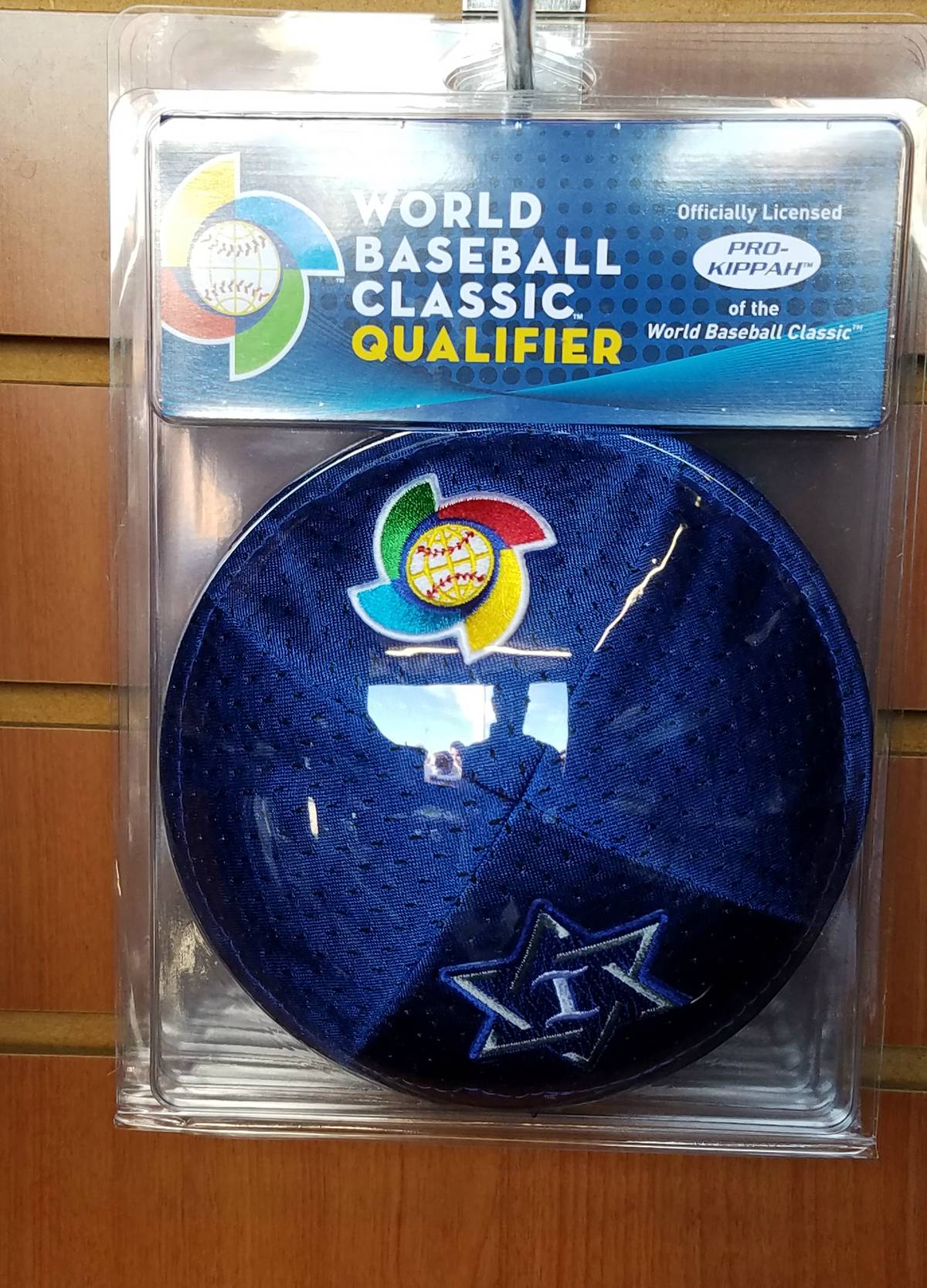
I decided to talk to some adults, who are not nearly as fun. Adults are hardened and grizzled, stuffed with real pressing complaints. But not Steve Wagman, the father of Joey Wagman, a relief pitcher on Team Israel, who plays minor league ball as part of the Oakland Athletics organization. Steve told me about his son’s love for the game of baseball, and how he has never played on Yom Kippur since he was a kid, and how his children had gone to Israel on Birthright a few years ago and loved it. “It was one of the greatest things they’d ever done,” he said.
All of that love and admiration made me hungry, like kosher hungry. On the way to the Glatt stand a Coldplay song was played too loudly, which is to say that I heard it, and it almost ruined my appetite. But I pulled through. I then introduced myself to Eli Arje, 31, who was running the Glatt kosher stand because that’s what journalists do and also because whomever is in control of food is an important person and deserves respect from the get-go. I ordered a hot dog and a sausage from Eli, who was kind, and because I’m eating more protein these days. Then I soaked them in sauerkraut and relish and ketchup and mustard and brought them down to my seat, any seat really, which is one of the beautiful things about attending a small-town game: you can basically sit anywhere. I ate them in two minutes, which is how food should be eaten at a baseball game, hard and fast. There is no other way.
After I shoveled that down I spotted a man who was scorekeeping the game by himself. I wondered to myself if solo scorekeeping on a sunny afternoon is what life is all truly about: paying attention to details, being involved, relaxing, soaking in vitamin D, watching a game of baseball between teams representing two continents. For John Briggs, 61, it sure seemed that way. He was in town from Kentucky, near Fort Knox, to visit his son, a teacher in New Jersey. The two of them would attend the night game together, and Briggs decided to take the day game in for himself. He brought his glove, a 30-year-old Louisville Slugger, if needed. He ate a hot dog at Nathan’s at 11 a.m. “This game,” he said, “will turn a couple of [these kids] into fans.”
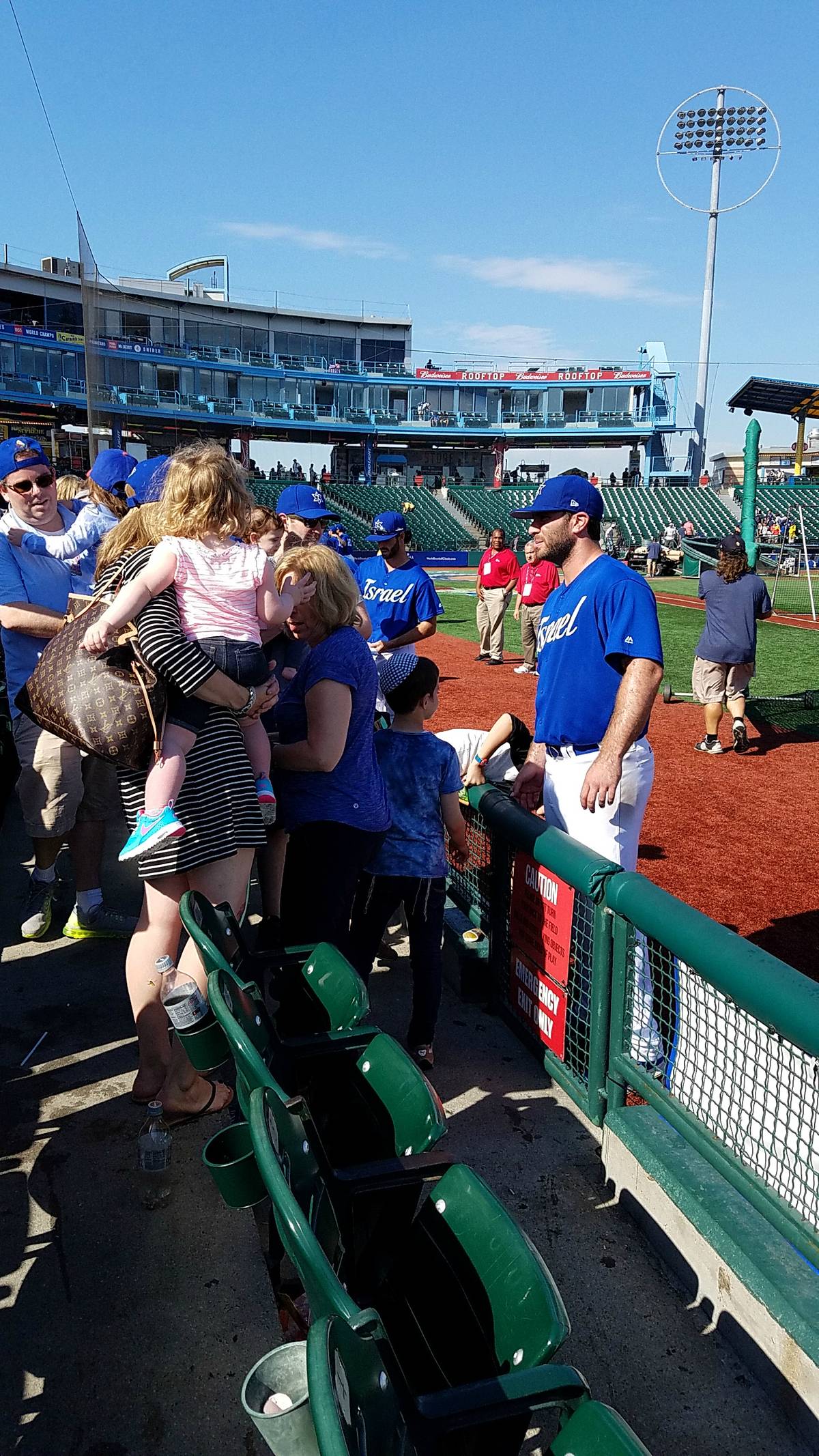
Below Briggs, sitting in the front row of the Israel side, were Sara and Adam Vargas, who were married about five years ago. They met in college, and they now live in Beacon, New York. Adam’s family is from Puerto Rico and he learned years ago that his Jewish lineage runs back to the 17th and 18th centuries, he said. She’s from Baltimore and pointed out that its sister city is Ashkelon, an Israeli city south of Tel Aviv.
Oh, and the game? Israel won, at that point making them 2-0 in the tournament. Afterwards, the players shook hands and hugged and made their way to the stands to meet up with family and friends and fans.
Soon, Peter Kurz, the team’s president, walked near me. He was all smiles. He told me about a picture that was just taken by home plate, of the nine players and staff that were members of the team three years ago, when Israel lost to Spain in extra innings. “Were gonna be back Sunday to win,” he told me. And they did, by crushing Great Britain to earn a spot in the 2017 World Baseball Classic for the first time in the team’s history.
And as the sun began to fall from its peak, and the schoolkids headed home in time for Shabbat, Benjy Stocker, 25, waved an Israel flag that one of the relievers had given him. He’d done it all game long. “Why are you waving the flag?” I asked him. “Cuz,” he said. “Cuz Israel.”
Previous: Israel’s Baseball Team Is Ready to Rock Coney Island—and Maybe Shock the World
Missing From Israel’s Baseball Team: Israelis
Jonathan Zalman is a writer and teacher based in Brooklyn.